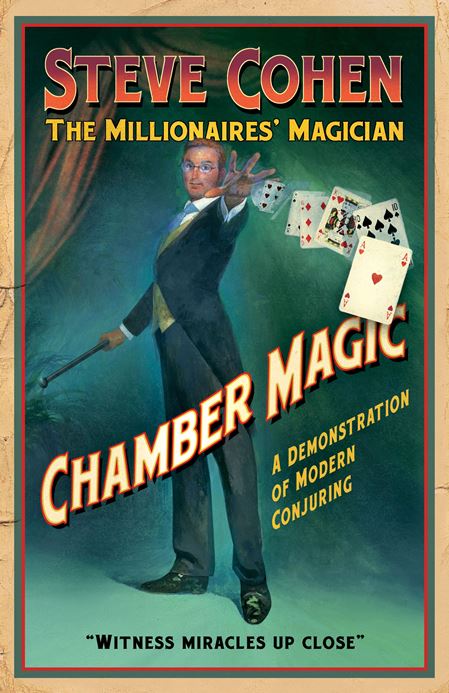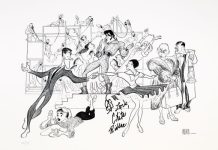Known as the “Millionaires’ Magician” for having entertained such famous patrons as Warren Buffett, Stephen Sondheim, Michael Bloomberg. Buzz Aldrin, Guillermo del Toro, Katie Couric, Seth Rogen, the Queen of Morocco, and many others, Steve Cohen, born in Yonkers and raised in Chappaqua, NY, recently played his 6,000th performance of Chamber Magic in a private suite at the Lotte New York Palace Hotel, following his previous residency at the Waldorf Astoria, beginning in April 2001. That’s well more than the “fifteen minutes of fame” Andy Warhol predicted for everyone in the future.
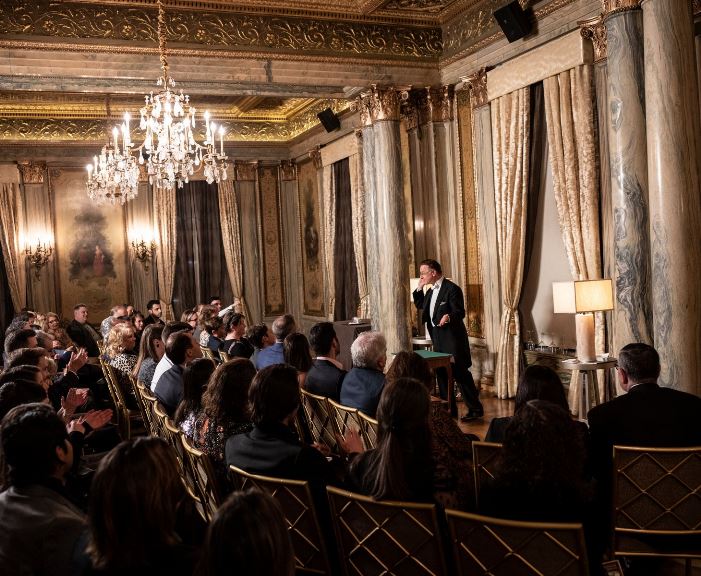
Recreating the look and feel of 19th-century parlor magic while incorporating mentalism into the repertoire, the show, with magician, author, and positioning expert Mark Levy serving as creative director, takes its inspiration and title from chamber music, an intimate form of classical concerts traditionally performed in the close quarters of small, sophisticated venues for an elite formally dressed audience.
The two-part interactive performance, presented without intermission, begins with a sampling of Cohen’s seamless sleight-of-hand tricks with playing cards and a silver dollar, followed by the amazing “Think-a-Drink,” in which the audience writes their favorite beverage on a card, and he then, without seeing their selections, conjures and pours them from a single teapot. It’s a trick that has not been done on the American stage since 1921. The second part examines ancient feats of unseen forces, telepathic tests, and more mind-boggling segments with multiple decks of cards. Throughout the show, the personable Cohen intersperses his magic with historic commentary, stories of his personal experiences, and humor, creating a great rapport with his audience, dazzling everyone with his mastery, and leaving us all wondering, “How did he do that?”
Steve made time during his four-show-a-week schedule to answer my rapid-fire questions about his background, his favorites, and his magical performance.
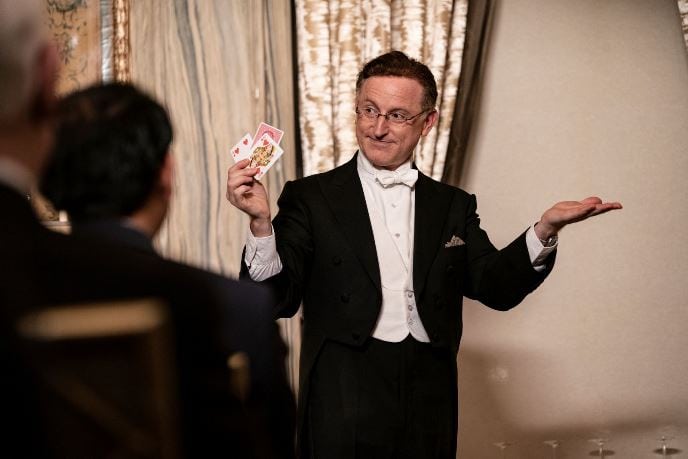
- What’s the first illusion you ever performed?
Steve: The first was “The Color-Changing Knife,” which was taught to me when I was about six or seven by my uncle, an amateur magician who was born in 1901, saw Houdini, and was inspired by him. He gave me a sharp pocket-knife that changed color – something you wouldn’t give to a kid now, but things were different in the 1970s! I still have it.
- At what age did you decide to become a professional magician?
I started performing at six years old and I always knew it was what I wanted to do. My first paid performance was at ten, at my four-year-old neighbor’s birthday party – my first paycheck! In high school and college, I thought it was a great skill that I possess, so it would make sense to capitalize on that.
- Who was the biggest inspiration in your career?
There were two magicians – Johann Nepomuk Hofzinser and Max Malini. The concept of doing a show in an intimate space was from Hofzinser, who did it in salon parlors in 19th-century Vienna. I brought it to New York a hundred years later. Malini inspired my style of magic. It’s impromptu, with few props; pulling a trick out of a hat at the drop of a hat! I followed in his footsteps and performed in many of the same venues as he did, and I just wrote a book about him that was published last year. He performed for kings and queens and four American presidents, so he was a Millionaires’ Magician before I was.
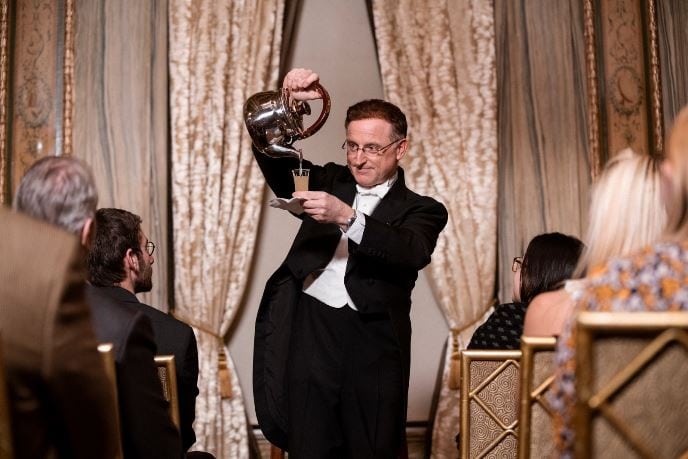
- Do you have one favorite enchantment that you never tire of performing?
I love “Think-a-Drink.” I feel like a real wizard, like Harry Potter. For the audience it’s wish fulfillment, that I can actually pour their favorite drinks; their eyes light up. The trick has been around for centuries and I’m one of the few who still performs it. Other magicians come to the show and shake their heads when they see it.
- What three emotions do you feel when you astonish an audience?
Commitment – to being a magician, to the character of a magician, and to the performance I’m giving people, so they have the feeling that they’re seeing real magic. That gives me a sense of feeling powerful – as should the audience, because they see that I, and therefore they, can do things they thought were impossible. And playfulness – the show for me is entertainment. People pay a lot of money to be entertained and I’m entertained by the audience. It’s a two-way playfulness.
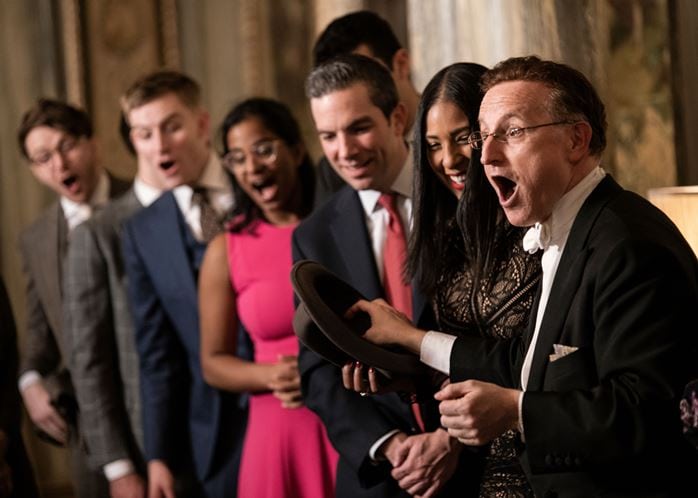
- What’s the most memorable reaction you’ve ever gotten from an audience member?
One was when Tracy Morgan came to the show. He brought his entire family and they sat in the front row. At one point, he threw his hands up in the air and screamed, “This guy is better than Houdini!” Another was at the Waldorf Astoria in Beverly Hills. Seth Rogen, who has such a distinctive laugh, was in the front row, and everyone in the audience recognized him. Every time he laughed the whole audience laughed; it was like a domino effect. Often people fall off their chairs, and once a pregnant woman went into labor, she was laughing so hard; she gave birth the next day.
- How long does it take you to perfect a feat and how many hours do you continue to practice once you’ve included it in the show?
It can take up to two years for me to feel it’s ready. For example, “Think-a-Drink’ took me a year-and-a-half to two years to master. I do about 250 shows a year, so the shows themselves serve as practice grounds – People Practice. I need a live audience for the tricks, so I get their participation and reactions, and can tweak the show based on their responses.
- What’s the main difference between magic and mentalism?
Mentalism is a branch of magic, more of a form for the grown-up mind. It feels and looks real, but there are secrets involved that are known to the magician and not the audience. Many performers have backgrounds in both. Mentalism is the magic of information and ideas, rather than props. I majored in psychology at Cornell, but I was always thinking about how it applies to my magic. It’s not physical magic, but it’s a genre of magic.
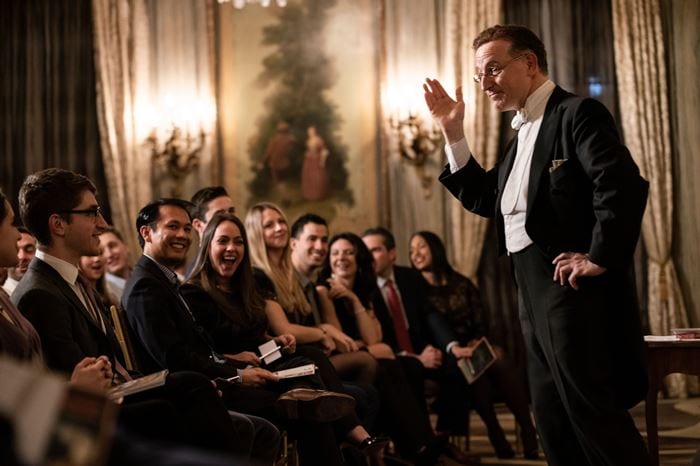
- What three skills are necessary to be successful in your field?
Empathy – you have to be able to see, feel, think, and understand what the audience is interpreting. Showmanship – you have to make the audience care about what they’re seeing. You have to hook them; it’s critical. As my mentor Harry Lorayne said, if you could sprout wings and fly around the room but didn’t make it entertaining, people wouldn’t care; a boring performer won’t be remembered. And dexterity – being able to manipulate objects with fluency and grace, so it looks natural. It’s inspirational when it’s obvious how much work went into it and you’re clearly a professional.
- What three things do you always have in your pockets?
I always have a deck of cards because I get stopped on the street every day by someone who’s been to my show (I’ve done more than 6,000). Sometimes I’ll do a trick for them, but even if I don’t, I always like to give them the deck I have with me. I often carry a silver dollar I had minted for my 20th anniversary, which I also give them. And my business card, which is a beautiful design that people save. I’m a magician but also a businessman and the show’s producer, so I don’t want to miss an opportunity.
- Have you ever been stumped by another magician’s trick?
All the time! I love being tricked and I’ll go out of my way to be fooled. Sometimes magicians go out of their way to fool their peers – a Magicians’ Magician. It’s a creative endeavor to stump another professional. I once flew from New York to LA just to see someone perform a card trick. I flew back to NY the next day. To me, it was worth the trip.
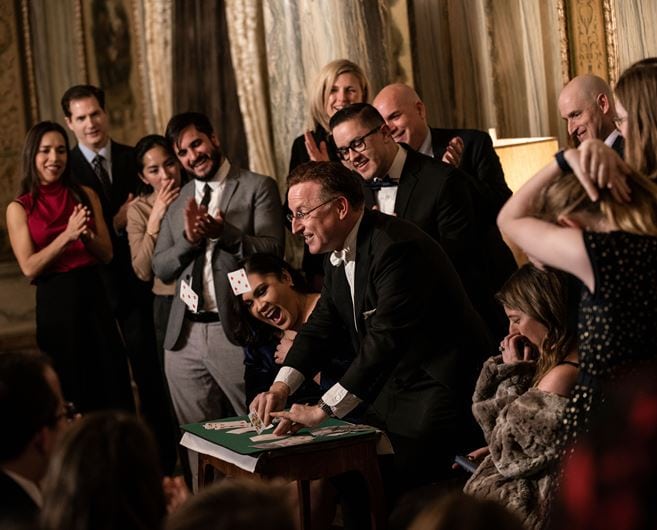
- What do you do for fun when you’re not performing?
I’m a long-distance runner and I’ll be running in my fifth NYC marathon. I spend a lot of time training and found that it has a spillover effect for my magic. I have much more stamina now after performing a full weekend, so it’s been a great benefit for my shows, even though I was doing it for exercise and fitness. I should bring a “Think-a-Drink” kettle for electrolytes!
- If you weren’t a magician, what would you be?
A theoretical physicist. I did a show in New York with Professor Brian Greene and the audience was blown away. I did an hour of magic and he did an hour lecture on Albert Einstein. Everyone was enraptured by his talk, in almost the same way I see in my audiences. Physics is similar to what a magician is trying to accomplish, but from the opposite side.
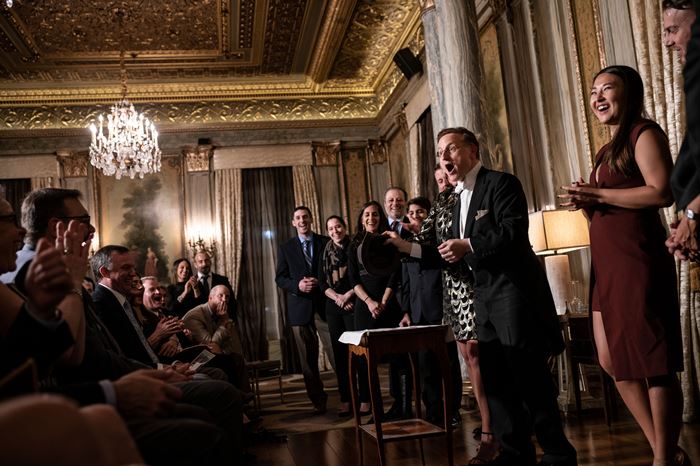
- What has being an illusionist taught you about human nature?
I’m a researcher of magic, always studying the 19th and 20th centuries and modern times, and I’ve found that the same tricks are still intriguing people. The tricks might be more advanced now, but the general themes remain the same – we’re always searching for the impossible, we’re always grasping for an impossible solution. There’s no true answer, but magic creates that kind of unattainable mystery.
- What do hope audiences take away from the show?
I hope they walk away with that sense of mystery. And if they’re dealing with negative issues in their lives or in the world, I hope they can forget all the pressures and step back in time to something different – that’s part of the reason for the formal dress code – and feel what it’s like to face the impossible.
Thanks, Steve, for giving our readers some insights into your history with magic and mentalism. I can honestly say that this is the first show I’ve ever attended that kept me completely puzzled and astonished; I highly recommend everyone see it, before it disappears – though its fame will live on!
Running Time: Approximately one hour and 45 minutes, without intermission.
Chamber Magic plays every weekend at the Lotte New York Palace Hotel, 455 Madison Avenue (enter on 50th Street), NYC. For tickets (priced at $125-375, plus fees), go online. Cocktail attire is required.
Before you go, you can watch a trailer of the show here:


